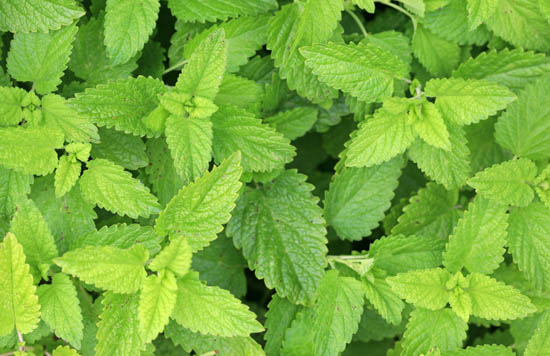
Lemon balm may be known as the “calming herb” because of its mild sedative action in people, but it sure gets bees in the garden buzzing while keeping mosquitoes at bay. Country cooks use the herb to flavor beverages, baked goods and meat dishes. The herb is featured in medicinal formulas and spirits that have survived for centuries, and one member of royalty indulged in a daily cup of lemon balm tea—and lived more than a century himself.
Lemon Balm (Melissa officinalis), also known as Sweet Mary, Honey Plant and Cure-All, is a member of the mint family that is native to Europe and the Mediterranean. For more than 2,000 years, this herb has been cultivated as a culinary and medicinal plant. It is regarded as a “calming” herb and traditionally used to combat anxiety, stress and insomnia, to treat wounds, ease indigestion and to stimulate the appetite.
The Greeks called lemon balm "melisophyllon," which marries the words melissa meaning "honeybee" and phyllon for "leaf." The Romans knew the plant as "apiastrum" from apias, to mean simply "bee." By now you’ve probably figured out that bees have a strong association with this plant. Sixteenth-century gardeners certainly knew this since they rubbed the leaves of the plant on beehives to increase the production of honey inside. Pliny also observed that because bees so often colonize in its proximity, sighting the plant while in flower could be useful in locating the hive. Today, many gardeners consider lemon balm the hub of the flower garden because its nectar-filled flowers not only attract bees to promote pollination, but hummingbirds and butterflies as well. However, some people make the mistake of calling this herb bee balm when that common name is actually reserved for a species of Monarda.
Lemon balm tea has enjoyed a long reputation as a rejuvenating tonic. In fact, the Prince of Glamorgan and King Charles V of France reputedly drank lemon balm tea daily to ensure good health and longevity. Unfortunately, the king suffered from an abscess in his left arm that was thought to be the result of an attempted poisoning, and he died when he was only 42. The prince, on the other hand, fared much better, having enjoyed many cups of lemon balm tea until his death at the age of 108.
The 17th century Carmelite nuns made their famous Carmelite Water by combining lemon balm with lemon zest, angelica root, nutmeg and coriander. This formula was sold for hundreds of years under the name Eau de Me`lisse de Carmes and was used to treat various nervous disorders. It still appears in German shops as Klosterfqu Melissengeist. The extract of lemon balm is sometimes referred to as the "spirit" or "compound" of Melissa and is still listed in Germany's Pharmacopoeia. However, it has been largely displaced commercially by citronella oil (Cymbopogon nardus), a less expensive alternative with similar properties.
One of the primary actions of lemon balm is to produce a mild sedative effect. Homer made reference this in The Odyssey, and Culpeper praised the virtue of the plant as a sedative when he wrote that it "...driveth away all troublesome cares and thoughts out of the mind, arising from melancholy..." The Roman emperor, Charlemagne, or Charles the Great, appreciated the calming effect of this herb so much that he proclaimed that it should be grown in every medicinal herb garden within his domain as long as he ruled, which was a span of 47 years. The sedative action of lemon balm is due to the presence of rosmarinic acid, which inhibits an enzyme involved in the triggering symptoms of anxiety and other mood disorders called GABA transaminase. However, this means that lemon balm may increase the effect of anti-anxiety medications, so the two should never be combined.
Rubbing lemon balm leaves over the skin deters pesky insects, namely mosquitoes. The herb is also useful in treating insect bites, a remedy first proposed by the Greek physician, Dioscorides The long-held belief that placing the fresh leaves upon a wound, or using the tea to combat colds and fevers is supported by the plant's antiviral and antihistamine activity due to the presence of eugenol. This substance has also demonstrated effectiveness in checking viral replication in cold sores and lesions, including those induced by the Herpes Simplex virus. Some studies suggest the herb might even prevent cell division in some kinds of tumors, although King Charles might argue this point.
Lemon balm has also demonstrated an ability to prevent the production of thyroid-stimulating hormone (TSH), which may make it useful in treating an overactive thyroid. Of course, you’ll want to check with your doctor before supplementing with this herb if you have a history of thyroid trouble, especially if you are taking any prescription thyroid medications.
Lemon Balm Iced Tea Recipe
